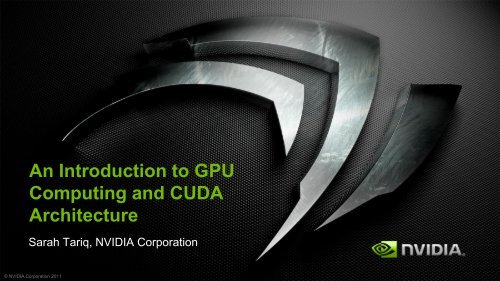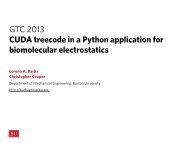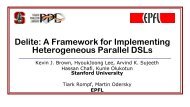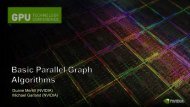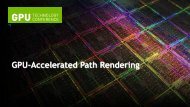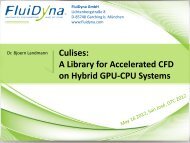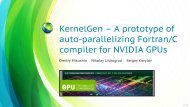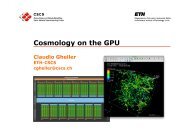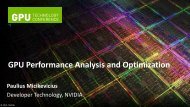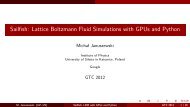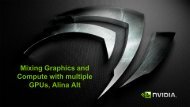Introduction to CUDA C/C++
Introduction to CUDA C/C++
Introduction to CUDA C/C++
You also want an ePaper? Increase the reach of your titles
YUMPU automatically turns print PDFs into web optimized ePapers that Google loves.
An <strong>Introduction</strong> <strong>to</strong> GPU<br />
Computing and <strong>CUDA</strong><br />
Architecture<br />
Sarah Tariq, NVIDIA Corporation<br />
© NVIDIA Corporation 2011
GPU Computing<br />
• GPU: Graphics Processing Unit<br />
• Traditionally used for real-time<br />
rendering<br />
• High computational density (100s<br />
of ALUs) and memory bandwidth<br />
(100+ GB/s)<br />
• Throughput processor: 1000s of<br />
concurrent threads <strong>to</strong> hide latency<br />
(vs. large fast caches)<br />
© NVIDIA Corporation 2011
What is <strong>CUDA</strong>?<br />
• <strong>CUDA</strong> Architecture<br />
• Expose GPU computing for general purpose<br />
• Retain performance<br />
• <strong>CUDA</strong> C/<strong>C++</strong><br />
• Based on industry-standard C/<strong>C++</strong><br />
• Small set of extensions <strong>to</strong> enable heterogeneous programming<br />
• Straightforward APIs <strong>to</strong> manage devices, memory etc.<br />
• This session introduces <strong>CUDA</strong> C/<strong>C++</strong><br />
© NVIDIA Corporation 2011
<strong>Introduction</strong> <strong>to</strong> <strong>CUDA</strong> C/<strong>C++</strong><br />
• What will you learn in this session?<br />
• Start from “Hello World!”<br />
• Write and launch <strong>CUDA</strong> C/<strong>C++</strong> kernels<br />
• Manage GPU memory<br />
• Manage communication and synchronization<br />
© NVIDIA Corporation 2011
Prerequisites<br />
• You (probably) need experience with C or <strong>C++</strong><br />
• You don’t need GPU experience<br />
• You don’t need parallel programming experience<br />
• You don’t need graphics experience<br />
© NVIDIA Corporation 2011
Heterogeneous Computing<br />
Blocks<br />
Threads<br />
CONCEPTS<br />
Indexing<br />
Shared memory<br />
__syncthreads()<br />
Asynchronous operation<br />
Handling errors<br />
Managing devices<br />
© NVIDIA Corporation 2011
CONCEPTS<br />
Heterogeneous Computing<br />
Blocks<br />
Threads<br />
Indexing<br />
Shared memory<br />
__syncthreads()<br />
Asynchronous operation<br />
HELLO WORLD!<br />
Handling errors<br />
Managing devices<br />
© NVIDIA Corporation 2011
Heterogeneous Computing<br />
• Terminology:<br />
• Host The CPU and its memory (host memory)<br />
• Device The GPU and its memory (device memory)<br />
Host<br />
Device<br />
© NVIDIA Corporation 2011
Heterogeneous Computing<br />
#include <br />
#include <br />
using namespace std;<br />
#define N 1024<br />
#define RADIUS 3<br />
#define BLOCK_SIZE 16<br />
__global__ void stencil_1d(int *in, int *out) {<br />
__shared__ int temp[BLOCK_SIZE + 2 * RADIUS];<br />
int gindex = threadIdx.x + blockIdx.x * blockDim.x;<br />
int lindex = threadIdx.x + RADIUS;<br />
// Read input elements in<strong>to</strong> shared memory<br />
temp[lindex] = in[gindex];<br />
if (threadIdx.x < RADIUS) {<br />
temp[lindex - RADIUS] = in[gindex - RADIUS];<br />
temp[lindex + BLOCK_SIZE] = in[gindex + BLOCK_SIZE];<br />
}<br />
// Synchronize (ensure all the data is available)<br />
__syncthreads();<br />
parallel fn<br />
// Apply the stencil<br />
int result = 0;<br />
for (int offset = -RADIUS ; offset
Simple Processing Flow<br />
PCI Bus<br />
1. Copy input data from CPU memory <strong>to</strong> GPU<br />
memory<br />
© NVIDIA Corporation 2011
Simple Processing Flow<br />
PCI Bus<br />
1. Copy input data from CPU memory <strong>to</strong> GPU<br />
memory<br />
2. Load GPU program and execute,<br />
caching data on chip for performance<br />
© NVIDIA Corporation 2011
Simple Processing Flow<br />
PCI Bus<br />
1. Copy input data from CPU memory <strong>to</strong> GPU<br />
memory<br />
2. Load GPU program and execute,<br />
caching data on chip for performance<br />
3. Copy results from GPU memory <strong>to</strong> CPU<br />
memory<br />
© NVIDIA Corporation 2011
Hello World!<br />
int main(void) {<br />
printf("Hello World!\n");<br />
return 0;<br />
}<br />
• Standard C that runs on the host<br />
• NVIDIA compiler (nvcc) can be used <strong>to</strong> compile<br />
programs with no device code<br />
Output:<br />
$ nvcc<br />
hello_world.cu<br />
$ a.out<br />
Hello World!<br />
$<br />
© NVIDIA Corporation 2011
Hello World! with Device Code<br />
__global__ void mykernel(void) {<br />
}<br />
int main(void) {<br />
mykernel();<br />
printf("Hello World!\n");<br />
return 0;<br />
}<br />
• Two new syntactic elements…<br />
© NVIDIA Corporation 2011
Hello World! with Device Code<br />
__global__ void mykernel(void) {<br />
}<br />
• <strong>CUDA</strong> C/<strong>C++</strong> keyword __global__ indicates a function that:<br />
• Runs on the device<br />
• Is called from host code<br />
• nvcc separates source code in<strong>to</strong> host and device components<br />
• Device functions (e.g. mykernel()) processed by NVIDIA compiler<br />
• Host functions (e.g. main()) processed by standard host compiler<br />
- gcc, cl.exe<br />
© NVIDIA Corporation 2011
Hello World! with Device Code<br />
mykernel();<br />
• Triple angle brackets mark a call from host code <strong>to</strong> device code<br />
• Also called a “kernel launch”<br />
• We’ll return <strong>to</strong> the parameters (1,1) in a moment<br />
• That’s all that is required <strong>to</strong> execute a function on the GPU!<br />
© NVIDIA Corporation 2011
Hello World! with Device Code<br />
__global__ void mykernel(void) {<br />
}<br />
int main(void) {<br />
mykernel();<br />
printf("Hello World!\n");<br />
return 0;<br />
}<br />
Output:<br />
$ nvcc hello.cu<br />
$ a.out<br />
Hello World!<br />
$<br />
• mykernel() does nothing, somewhat<br />
anticlimactic!<br />
© NVIDIA Corporation 2011
Parallel Programming in <strong>CUDA</strong> C/<strong>C++</strong><br />
• But wait… GPU computing is about massive<br />
parallelism!<br />
• We need a more interesting example…<br />
• We’ll start by adding two integers and build up<br />
<strong>to</strong> vec<strong>to</strong>r addition<br />
a b c<br />
© NVIDIA Corporation 2011
Addition on the Device<br />
• A simple kernel <strong>to</strong> add two integers<br />
__global__ void add(int *a, int *b, int *c) {<br />
}<br />
*c = *a + *b;<br />
• As before __global__ is a <strong>CUDA</strong> C/<strong>C++</strong> keyword meaning<br />
• add() will execute on the device<br />
• add() will be called from the host<br />
© NVIDIA Corporation 2011
Addition on the Device<br />
• Note that we use pointers for the variables<br />
__global__ void add(int *a, int *b, int *c) {<br />
}<br />
*c = *a + *b;<br />
• add() runs on the device, so a, b and c must point <strong>to</strong> device memory<br />
• We need <strong>to</strong> allocate memory on the GPU<br />
© NVIDIA Corporation 2011
Memory Management<br />
• Host and device memory are separate entities<br />
• Device pointers point <strong>to</strong> GPU memory<br />
May be passed <strong>to</strong>/from host code<br />
May not be dereferenced in host code<br />
• Host pointers point <strong>to</strong> CPU memory<br />
May be passed <strong>to</strong>/from device code<br />
May not be dereferenced in device code<br />
• Simple <strong>CUDA</strong> API for handling device memory<br />
• cudaMalloc(), cudaFree(), cudaMemcpy()<br />
• Similar <strong>to</strong> the C equivalents malloc(), free(), memcpy()<br />
© NVIDIA Corporation 2011
Addition on the Device: add()<br />
• Returning <strong>to</strong> our add() kernel<br />
__global__ void add(int *a, int *b, int *c) {<br />
}<br />
*c = *a + *b;<br />
• Let’s take a look at main()…<br />
© NVIDIA Corporation 2011
Addition on the Device: main()<br />
int main(void) {<br />
int a, b, c;<br />
int *d_a, *d_b, *d_c;<br />
int size = sizeof(int);<br />
// host copies of a, b, c<br />
// device copies of a, b, c<br />
// Allocate space for device copies of a, b, c<br />
cudaMalloc((void **)&d_a, size);<br />
cudaMalloc((void **)&d_b, size);<br />
cudaMalloc((void **)&d_c, size);<br />
// Setup input values<br />
a = 2;<br />
b = 7;<br />
© NVIDIA Corporation 2011
Addition on the Device: main()<br />
// Copy inputs <strong>to</strong> device<br />
cudaMemcpy(d_a, &a, size, cudaMemcpyHostToDevice);<br />
cudaMemcpy(d_b, &b, size, cudaMemcpyHostToDevice);<br />
// Launch add() kernel on GPU<br />
add(d_a, d_b, d_c);<br />
// Copy result back <strong>to</strong> host<br />
cudaMemcpy(&c, d_c, size, cudaMemcpyDeviceToHost);<br />
}<br />
// Cleanup<br />
cudaFree(d_a); cudaFree(d_b); cudaFree(d_c);<br />
return 0;<br />
© NVIDIA Corporation 2011
CONCEPTS<br />
Heterogeneous Computing<br />
Blocks<br />
Threads<br />
Indexing<br />
Shared memory<br />
__syncthreads()<br />
Asynchronous operation<br />
RUNNING IN PARALLEL<br />
Handling errors<br />
Managing devices<br />
© NVIDIA Corporation 2011
Moving <strong>to</strong> Parallel<br />
• GPU computing is about massive parallelism<br />
• So how do we run code in parallel on the device?<br />
add>();<br />
add>();<br />
• Instead of executing add() once, execute N times in parallel<br />
© NVIDIA Corporation 2011
Vec<strong>to</strong>r Addition on the Device<br />
• With add() running in parallel we can do vec<strong>to</strong>r addition<br />
• Terminology: each parallel invocation of add() is referred <strong>to</strong> as a block<br />
• The set of blocks is referred <strong>to</strong> as a grid<br />
• Each invocation can refer <strong>to</strong> its block index using blockIdx.x<br />
__global__ void add(int *a, int *b, int *c) {<br />
}<br />
c[blockIdx.x] = a[blockIdx.x] + b[blockIdx.x];<br />
• By using blockIdx.x <strong>to</strong> index in<strong>to</strong> the array, each block handles a<br />
different index<br />
© NVIDIA Corporation 2011
Vec<strong>to</strong>r Addition on the Device<br />
__global__ void add(int *a, int *b, int *c) {<br />
}<br />
c[blockIdx.x] = a[blockIdx.x] + b[blockIdx.x];<br />
• On the device, each block can execute in parallel:<br />
Block 0 Block 1<br />
c[0] = a[0] + b[0];<br />
c[1] = a[1] + b[1];<br />
Block 2 Block 3<br />
c[2] = a[2] + b[2];<br />
c[3] = a[3] + b[3];<br />
© NVIDIA Corporation 2011
Vec<strong>to</strong>r Addition on the Device: main()<br />
#define N 512<br />
int main(void) {<br />
int *a, *b, *c;<br />
int *d_a, *d_b, *d_c;<br />
int size = N * sizeof(int);<br />
// host copies of a, b, c<br />
// device copies of a, b, c<br />
// Alloc space for device copies of a, b, c<br />
cudaMalloc((void **)&d_a, size);<br />
cudaMalloc((void **)&d_b, size);<br />
cudaMalloc((void **)&d_c, size);<br />
// Alloc space for host copies of a, b, c and setup input values<br />
a = (int *)malloc(size); random_ints(a, N);<br />
b = (int *)malloc(size); random_ints(b, N);<br />
c = (int *)malloc(size);<br />
© NVIDIA Corporation 2011
Vec<strong>to</strong>r Addition on the Device: main()<br />
// Copy inputs <strong>to</strong> device<br />
cudaMemcpy(d_a, a, size, cudaMemcpyHostToDevice);<br />
cudaMemcpy(d_b, b, size, cudaMemcpyHostToDevice);<br />
// Launch add() kernel on GPU with N blocks<br />
add(d_a, d_b, d_c);<br />
// Copy result back <strong>to</strong> host<br />
cudaMemcpy(c, d_c, size, cudaMemcpyDeviceToHost);<br />
}<br />
// Cleanup<br />
free(a); free(b); free(c);<br />
cudaFree(d_a); cudaFree(d_b); cudaFree(d_c);<br />
return 0;<br />
© NVIDIA Corporation 2011
Review (1 of 2)<br />
• Difference between host and device<br />
• Host CPU<br />
• Device GPU<br />
• Using __global__ <strong>to</strong> declare a function as device code<br />
• Executes on the device<br />
• Called from the host<br />
• Passing parameters from host code <strong>to</strong> a device function<br />
© NVIDIA Corporation 2011
Review (2 of 2)<br />
• Basic device memory management<br />
• cudaMalloc()<br />
• cudaMemcpy()<br />
• cudaFree()<br />
• Launching parallel kernels<br />
• Launch N copies of add() with add(…);<br />
• Use blockIdx.x <strong>to</strong> access block index<br />
© NVIDIA Corporation 2011
CONCEPTS<br />
Heterogeneous Computing<br />
Blocks<br />
Threads<br />
Indexing<br />
Shared memory<br />
__syncthreads()<br />
Asynchronous operation<br />
INTRODUCING THREADS<br />
Handling errors<br />
Managing devices<br />
© NVIDIA Corporation 2011
<strong>CUDA</strong> Threads<br />
• Terminology: a block can be split in<strong>to</strong> parallel threads<br />
• Let’s change add() <strong>to</strong> use parallel threads instead of parallel blocks<br />
Using blocks:<br />
__global__ __global__ void add(int void *a, add(int *b, *a, int *c) *b, { int *c) {<br />
c[blockIdx.x]<br />
c[blockIdx.x]<br />
= a[blockIdx.x]<br />
= a[blockIdx.x]<br />
+ b[blockIdx.x];<br />
+ b[blockIdx.x];<br />
}<br />
}<br />
add(d_a, d_b, d_c);<br />
Using threads:<br />
__global__ void add(int *a, int *b, int *c) {<br />
c[threadIdx.x] = a[threadIdx.x] + b[threadIdx.x];<br />
}<br />
add(d_a, d_b, d_c);<br />
© NVIDIA Corporation 2011
CONCEPTS<br />
Heterogeneous Computing<br />
Blocks<br />
Threads<br />
Indexing<br />
Shared memory<br />
__syncthreads()<br />
Asynchronous operation<br />
COMBINING THREADS<br />
AND BLOCKS<br />
Handling errors<br />
Managing devices<br />
© NVIDIA Corporation 2011
Combining Blocks and Threads<br />
• We’ve seen parallel vec<strong>to</strong>r addition using:<br />
• Many blocks with one thread each<br />
• One block with many threads<br />
• Let’s adapt vec<strong>to</strong>r addition <strong>to</strong> use both blocks and threads<br />
© NVIDIA Corporation 2011
Indexing Arrays with Blocks and Threads<br />
• No longer as simple as using blockIdx.x and threadIdx.x<br />
• Consider indexing an array with one element per thread (8 threads/block)<br />
threadIdx.x threadIdx.x threadIdx.x threadIdx.x<br />
0 1 2 3 4 5 6 7 0 1 2 3 4 5 6 7 0 1 2 3 4 5 6 7 0 1 2 3 4 5 6 7<br />
blockIdx.x = 0 blockIdx.x = 1 blockIdx.x = 2 blockIdx.x = 3<br />
• With M threads/block a unique index for each thread is given by:<br />
int index = threadIdx.x + blockIdx.x * M;<br />
© NVIDIA Corporation 2011
Vec<strong>to</strong>r Addition with Blocks and Threads<br />
• Use the built-in variable blockDim.x for threads per block<br />
int index = threadIdx.x + blockIdx.x * blockDim.x;<br />
• Combined version of add() <strong>to</strong> use parallel threads and parallel blocks<br />
__global__ void add(int *a, int *b, int *c) {<br />
int index = threadIdx.x + blockIdx.x * blockDim.x;<br />
c[index] = a[index] + b[index];<br />
}<br />
• What changes need <strong>to</strong> be made in main()?<br />
© NVIDIA Corporation 2011
Addition with Blocks and Threads: main()<br />
#define N (2048*2048)<br />
#define THREADS_PER_BLOCK 512<br />
int main(void) {<br />
int *a, *b, *c;<br />
int *d_a, *d_b, *d_c;<br />
int size = N * sizeof(int);<br />
// host copies of a, b, c<br />
// device copies of a, b, c<br />
// Alloc space for device copies of a, b, c<br />
cudaMalloc((void **)&d_a, size);<br />
cudaMalloc((void **)&d_b, size);<br />
cudaMalloc((void **)&d_c, size);<br />
// Alloc space for host copies of a, b, c and setup input values<br />
a = (int *)malloc(size); random_ints(a, N);<br />
b = (int *)malloc(size); random_ints(b, N);<br />
c = (int *)malloc(size);<br />
© NVIDIA Corporation 2011
Addition with Blocks and Threads: main()<br />
// Copy inputs <strong>to</strong> device<br />
cudaMemcpy(d_a, a, size, cudaMemcpyHostToDevice);<br />
cudaMemcpy(d_b, b, size, cudaMemcpyHostToDevice);<br />
// Launch add() kernel on GPU<br />
add(d_a, d_b, d_c);<br />
// Copy result back <strong>to</strong> host<br />
cudaMemcpy(c, d_c, size, cudaMemcpyDeviceToHost);<br />
}<br />
// Cleanup<br />
free(a); free(b); free(c);<br />
cudaFree(d_a); cudaFree(d_b); cudaFree(d_c);<br />
return 0;<br />
© NVIDIA Corporation 2011
Handling Arbitrary Vec<strong>to</strong>r Sizes<br />
• Typical problems are not friendly multiples of blockDim.x<br />
• Avoid accessing beyond the end of the arrays:<br />
__global__ void add(int *a, int *b, int *c, int n) {<br />
int index = threadIdx.x + blockIdx.x * blockDim.x;<br />
if (index < n)<br />
c[index] = a[index] + b[index];<br />
}<br />
• Update the kernel launch:<br />
add(d_a, d_b, d_c, N);<br />
© NVIDIA Corporation 2011
Why Bother with Threads?<br />
• Threads seem unnecessary<br />
• They add a level of complexity<br />
• What do we gain?<br />
• Unlike parallel blocks, threads have mechanisms <strong>to</strong>:<br />
• Communicate<br />
• Synchronize<br />
• To look closer, we need a new example…<br />
© NVIDIA Corporation 2011
CONCEPTS<br />
Heterogeneous Computing<br />
Blocks<br />
Threads<br />
Indexing<br />
Shared memory<br />
__syncthreads()<br />
Asynchronous operation<br />
COOPERATING<br />
THREADS<br />
Handling errors<br />
Managing devices<br />
© NVIDIA Corporation 2011
1D Stencil<br />
• Consider applying a 1D stencil <strong>to</strong> a 1D array of elements<br />
• Each output element is the sum of input elements within a radius<br />
• If radius is 3, then each output element is the sum of 7 input elements:<br />
in<br />
radius<br />
radius<br />
out<br />
© NVIDIA Corporation 2011
Implementing Within a Block<br />
• Each thread processes one output element<br />
• blockDim.x elements per block<br />
• Input elements are read several times<br />
• With radius 3, each input element is read seven times<br />
in<br />
01<br />
23<br />
45<br />
67<br />
out<br />
© NVIDIA Corporation 2011
Sharing Data Between Threads<br />
• Terminology: within a block, threads share data via shared memory<br />
• Extremely fast on-chip memory, user-managed<br />
• Declare using __shared__, allocated per block<br />
• Data is not visible <strong>to</strong> threads in other blocks<br />
© NVIDIA Corporation 2011
Implementing With Shared Memory<br />
• Cache data in shared memory<br />
• Read (blockDim.x + 2 * radius) input elements from global memory <strong>to</strong><br />
shared memory<br />
• Compute blockDim.x output elements<br />
• Write blockDim.x output elements <strong>to</strong> global memory<br />
• Each block needs a halo of radius elements at each boundary<br />
in<br />
out<br />
halo on left<br />
halo on right<br />
© NVIDIA Corporation 2011<br />
blockDim.x output elements
Stencil Kernel<br />
__global__ void stencil_1d(int *in, int *out) {<br />
__shared__ int temp[BLOCK_SIZE + 2 * RADIUS];<br />
int gindex = threadIdx.x + blockIdx.x * blockDim.x;<br />
int lindex = threadIdx.x + RADIUS;<br />
// Read input elements in<strong>to</strong> shared memory<br />
temp[lindex] = in[gindex];<br />
if (threadIdx.x < RADIUS) {<br />
temp[lindex - RADIUS] = in[gindex - RADIUS];<br />
temp[lindex + BLOCK_SIZE] = in[gindex + BLOCK_SIZE];<br />
}<br />
© NVIDIA Corporation 2011
Stencil Kernel<br />
// Apply the stencil<br />
int result = 0;<br />
for (int offset = -RADIUS ; offset
Data Race!<br />
• The stencil example will not work…<br />
• Suppose thread 15 reads the halo before thread 0 has fetched it…<br />
temp[lindex] = in[gindex];<br />
if (threadIdx.x < RADIUS) {<br />
}<br />
temp[lindex – RADIUS = in[gindex – RADIUS];<br />
temp[lindex + BLOCK_SIZE] = in[gindex + BLOCK_SIZE];<br />
int result = 0;<br />
result += temp[lindex + 1];<br />
S<strong>to</strong>re at temp[18]<br />
Load from temp[19]<br />
Skipped, threadIdx > RADIUS<br />
© NVIDIA Corporation 2011
__syncthreads()<br />
• void __syncthreads();<br />
• Synchronizes all threads within a block<br />
• Used <strong>to</strong> prevent RAW / WAR / WAW hazards<br />
• All threads must reach the barrier<br />
• In conditional code, the condition must be uniform across the block<br />
© NVIDIA Corporation 2011
Stencil Kernel<br />
__global__ void stencil_1d(int *in, int *out) {<br />
__shared__ int temp[BLOCK_SIZE + 2 * RADIUS];<br />
int gindex = threadIdx.x + blockIdx.x * blockDim.x;<br />
int lindex = threadIdx.x + radius;<br />
// Read input elements in<strong>to</strong> shared memory<br />
temp[lindex] = in[gindex];<br />
if (threadIdx.x < RADIUS) {<br />
temp[lindex – RADIUS] = in[gindex – RADIUS];<br />
temp[lindex + BLOCK_SIZE] = in[gindex + BLOCK_SIZE];<br />
}<br />
// Synchronize (ensure all the data is available)<br />
__syncthreads();<br />
© NVIDIA Corporation 2011
Stencil Kernel<br />
// Apply the stencil<br />
int result = 0;<br />
for (int offset = -RADIUS ; offset
Review (1 of 2)<br />
• Launching parallel threads<br />
• Launch N blocks with M threads per block with kernel(…);<br />
• Use blockIdx.x <strong>to</strong> access block index within grid<br />
• Use threadIdx.x <strong>to</strong> access thread index within block<br />
• Allocate elements <strong>to</strong> threads:<br />
int index = threadIdx.x + blockIdx.x * blockDim.x;<br />
© NVIDIA Corporation 2011
Review (2 of 2)<br />
• Use __shared__ <strong>to</strong> declare a variable/array in shared memory<br />
• Data is shared between threads in a block<br />
• Not visible <strong>to</strong> threads in other blocks<br />
• Use __syncthreads() as a barrier<br />
• Use <strong>to</strong> prevent data hazards<br />
© NVIDIA Corporation 2011
CONCEPTS<br />
Heterogeneous Computing<br />
Blocks<br />
Threads<br />
Indexing<br />
Shared memory<br />
__syncthreads()<br />
Asynchronous operation<br />
MANAGING THE DEVICE<br />
Handling errors<br />
Managing devices<br />
© NVIDIA Corporation 2011
Coordinating Host & Device<br />
• Kernel launches are asynchronous<br />
• Control returns <strong>to</strong> the CPU immediately<br />
• CPU needs <strong>to</strong> synchronize before consuming the results<br />
cudaMemcpy()<br />
cudaMemcpyAsync()<br />
Blocks the CPU until the copy is complete<br />
Copy begins when all preceding <strong>CUDA</strong> calls have completed<br />
Asynchronous, does not block the CPU<br />
cudaDeviceSynchronize() Blocks the CPU until all preceding <strong>CUDA</strong> calls have completed<br />
© NVIDIA Corporation 2011
Reporting Errors<br />
• All <strong>CUDA</strong> API calls return an error code (cudaError_t)<br />
• Error in the API call itself<br />
OR<br />
• Error in an earlier asynchronous operation (e.g. kernel)<br />
• Get the error code for the last error:<br />
cudaError_t cudaGetLastError(void)<br />
• Get a string <strong>to</strong> describe the error:<br />
char *cudaGetErrorString(cudaError_t)<br />
printf("%s\n", cudaGetErrorString(cudaGetLastError()));<br />
© NVIDIA Corporation 2011
Device Management<br />
• Application can query and select GPUs<br />
cudaGetDeviceCount(int *count)<br />
cudaSetDevice(int device)<br />
cudaGetDevice(int *device)<br />
cudaGetDeviceProperties(cudaDeviceProp *prop, int device)<br />
• Multiple CPU threads can share a device<br />
• A single CPU thread can manage multiple devices<br />
cudaSetDevice(i) <strong>to</strong> select current device<br />
cudaMemcpy(…) for peer-<strong>to</strong>-peer copies ✝<br />
© NVIDIA Corporation 2011<br />
✝<br />
requires OS and device support
<strong>Introduction</strong> <strong>to</strong> <strong>CUDA</strong> C/<strong>C++</strong><br />
• What have we learnt?<br />
• Write and launch <strong>CUDA</strong> C/<strong>C++</strong> kernels<br />
- __global__, blockIdx.x, threadIdx.x, <br />
• Manage GPU memory<br />
- cudaMalloc(), cudaMemcpy(), cudaFree()<br />
• Manage communication and synchronization<br />
- __shared__, __syncthreads()<br />
- cudaMemcpy() vs cudaMemcpyAsync(), cudaDeviceSynchronize()<br />
© NVIDIA Corporation 2011
Resources<br />
• We skipped some details, you can learn more:<br />
• <strong>CUDA</strong> Programming Guide<br />
• <strong>CUDA</strong> Zone – <strong>to</strong>ols, training, webinars and more<br />
http://developer.nvidia.com/cuda<br />
© NVIDIA Corporation 2011
© NVIDIA Corporation 2011<br />
Questions?


